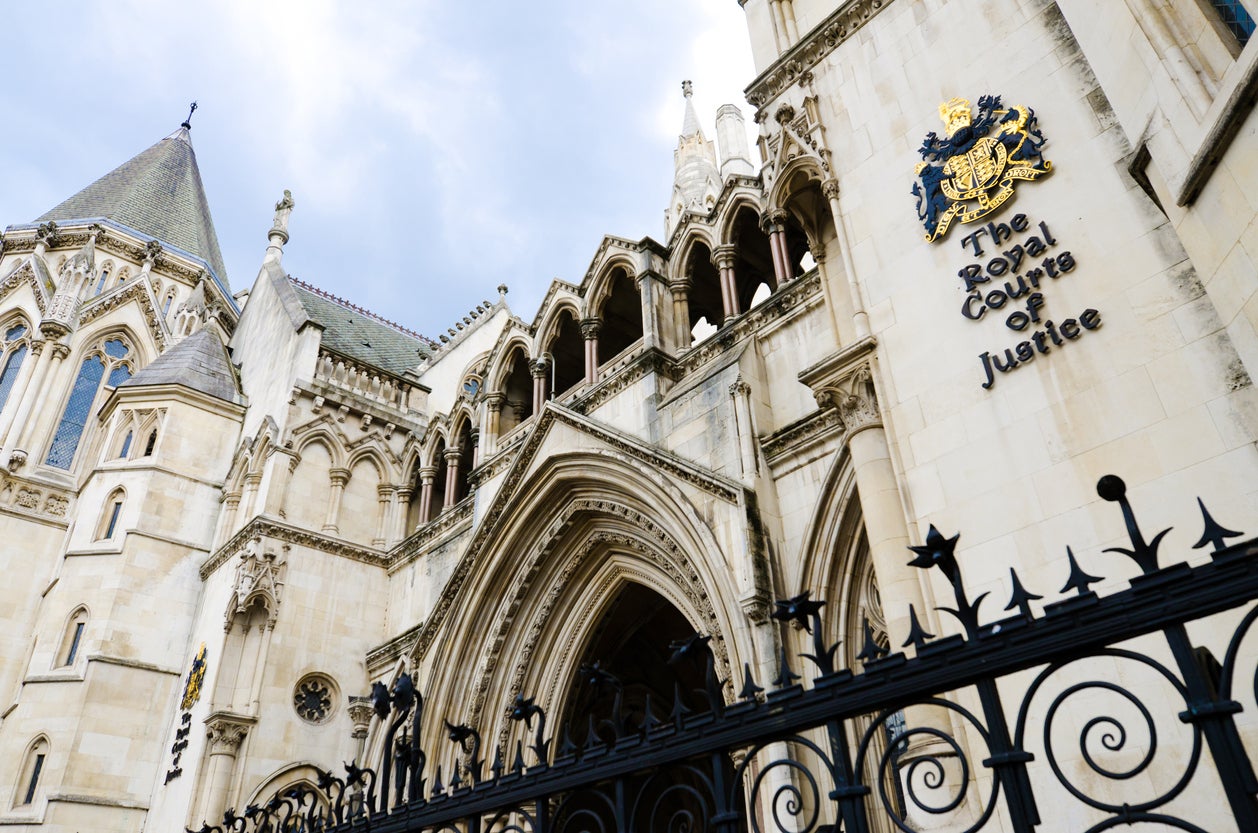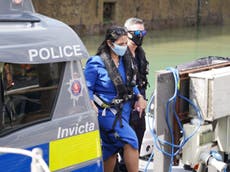Migrants jailed for steering dinghies across English Channel ‘just wanted to claim asylum’, court hears
Four men appealing convictions as government pushes to introduce life sentences for offence

Migrants who were jailed for steering dinghies across the English Channel just wanted to claim asylum, a court has heard.
Four men, who are currently serving sentences of between two and six years, are fighting their convictions at the Court of Appeal and its judgment will apply to at least seven others.
One of the men called 999 himself at sea, while another tried to flag a Border Force vessel down, and all said their sole intention crossing the Channel was to seek asylum.
But they were jailed for “assisting unlawful immigration” after being photographed piloting small boats from France by British authorities.
The Home Office labelled the men “people smugglers” and the government is backing laws that would make prosecutions easier and increase the maximum punishment to life imprisonment.
The Court of Appeal heard that no prosecutions of the kind happened until the UK started filming migrant vessels with drones in 2019.
It was told that around 20 asylum seekers have now been jailed for steering boats, and two more trials are due to be heard at Canterbury Crown Court in January.
Ben Douglas-Jones QC, representing the Crown Prosecution Service (CPS), said it did not initially conduct a “nuanced analysis” of the intentions of dinghy pilots, and brought charges on the basis that “heading towards land was sufficient” for an offence to be committed.
The barrister said guidance was changed after another asylum seeker had his conviction for assisting unlawful immigration overturned in March.
Appeal judges ruled that if it was Fouad Kakaei’s intention to be intercepted by British authorities and taken to a port where he could claim asylum, it may not “amount to a facilitation offence”.
Under the current law, people do not technically enter the UK if they are intercepted at sea or claim asylum at a port.
Mr Kakaei’s conviction was quashed and he was acquitted at a retrial, sparking a wave of dropped charges and the new appeals.
A barrister representing appellant Fariboz Rakei, who was jailed for four-and-a-half years in March, told the Court of Appeal the prosecutions “fall outside the thought behind” the immigration laws being used.
Aneurin Brewer said the offences were designed for people smugglers who exploited migrants, rather than asylum seekers offering “mutual aid” to each other.
“These actions are borne out of desperation rather than a financial motive,” he added. “Real desperation motivates people who make these crossings, be it people who are lucky enough to be passengers or unlucky enough to play the additional role of piloting their boat.”
Mr Brewer said that dinghies are often controlled by different people during a crossing, but only those photographed by British authorities are prosecuted, meaning they are criminalised and will have their asylum claims rejected.
The barrister questioned government claims that prison sentences act as a deterrent, following record numbers of Channel crossings after the prosecutions, and said migrants “have a very limited understanding of the legal situation in the UK”.
He told the court that some are forced to steer boats by people smugglers in France, while others take responsibility “out of genuine humanitarian concern for others”.
Mr Rakei told police he was threatened and assaulted by smugglers, and forced to get in the dinghy despite believing he was going to be transported as a stowaway on a lorry or large ship.
The court heard that the Iranian asylum seeker was trying to reach family in the UK, and relatives had paid for his passage.
Mr Rakei told police that he navigated the boat because he had nautical experience and felt he was the only person capable of steering it safely.

He said the intention was to be rescued at sea, and that he tried to shout for help from passing ships before calling 999.
“When they were approaching the UK he made several 999 calls informing the authority of their position, so the UK would know they did not pose any threat to security,” said an interview summary read to the court. “He did not try to hide anything.”
A barrister representing appellant Samyar Bani, who was prosecuted in June 2019 and jailed for six years, said he was incorrectly told he had no defence to the charge because of a “legal vacuum” around Channel crossings.
Jonathan Barker said it had been his purpose to claim asylum after being intercepted by authorities, and he had waved at Border Force vessels to attract their attention.
Mr Barker quoted from a transcript of Mr Bani’s trial, where he said: “My only aim was to seek asylum … I don’t know about immigration law, my only aim is seeking asylum, I don’t want to cause trouble for anyone or disrespect the law of another country.”
The third appellant, Kuwaiti Mohamoud al-Anzi, was jailed for three years and nine months in February and is also appealing his conviction for assisting unlawful immigration on the basis his intention was to seek asylum.
The fourth case, Iranian Ghodratallah Zadeh, pleaded guilty to the same offence and was jailed for two years in 2020.
Barrister Tim Owen QC said he had “not been given proper advice, bearing in mind all the uncertainties around this area of law”, and believed he had no defence.
“The question is whether the person who is charged with the facilitation offence has the necessary mens rea of intention or knowledge that he is assisting illegal travel,” he told the court.
“No doubt this is why the new offence and new legal framework is being created – to make it an offence to arise without a valid entry clearance.”
The government has included a clause in the Nationality and Borders Bill that could make such prosecutions easier, meaning that people do not have to technically enter the UK in order to commit a facilitation offence.
The proposed law would also increase the maximum sentence for the offence of assisting unlawful immigration to life, as well as raising the penalty for the separate offence of illegal entry from six months’ imprisonment to four years.
Lord Justice Edis, Ms Justice May and Sir Nicholas Blake reserved their judgment and will give their ruling at a later date.



